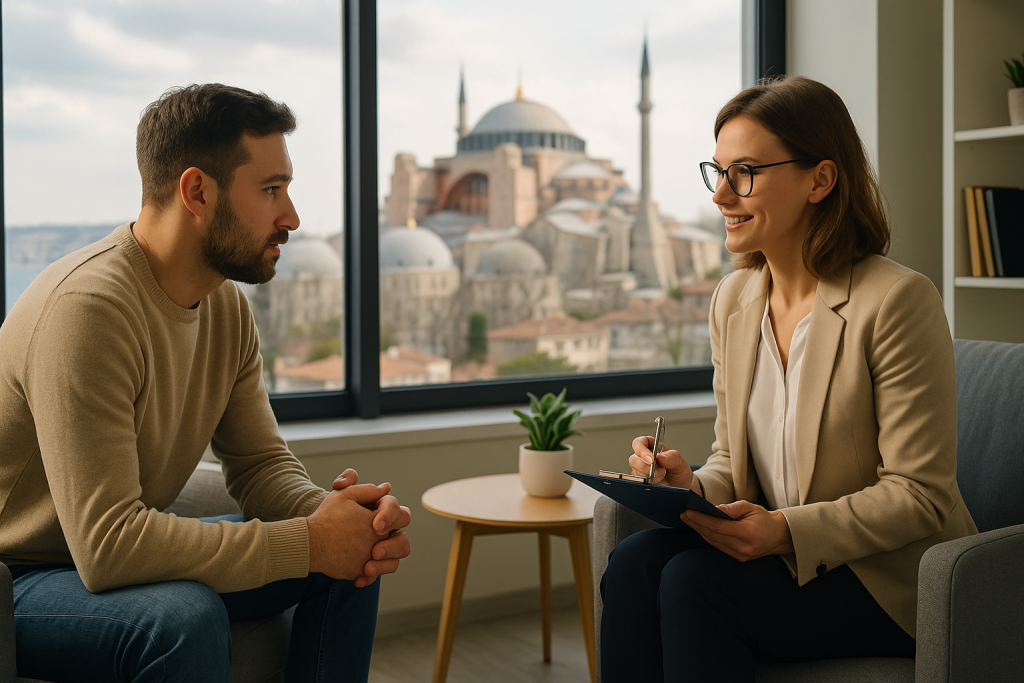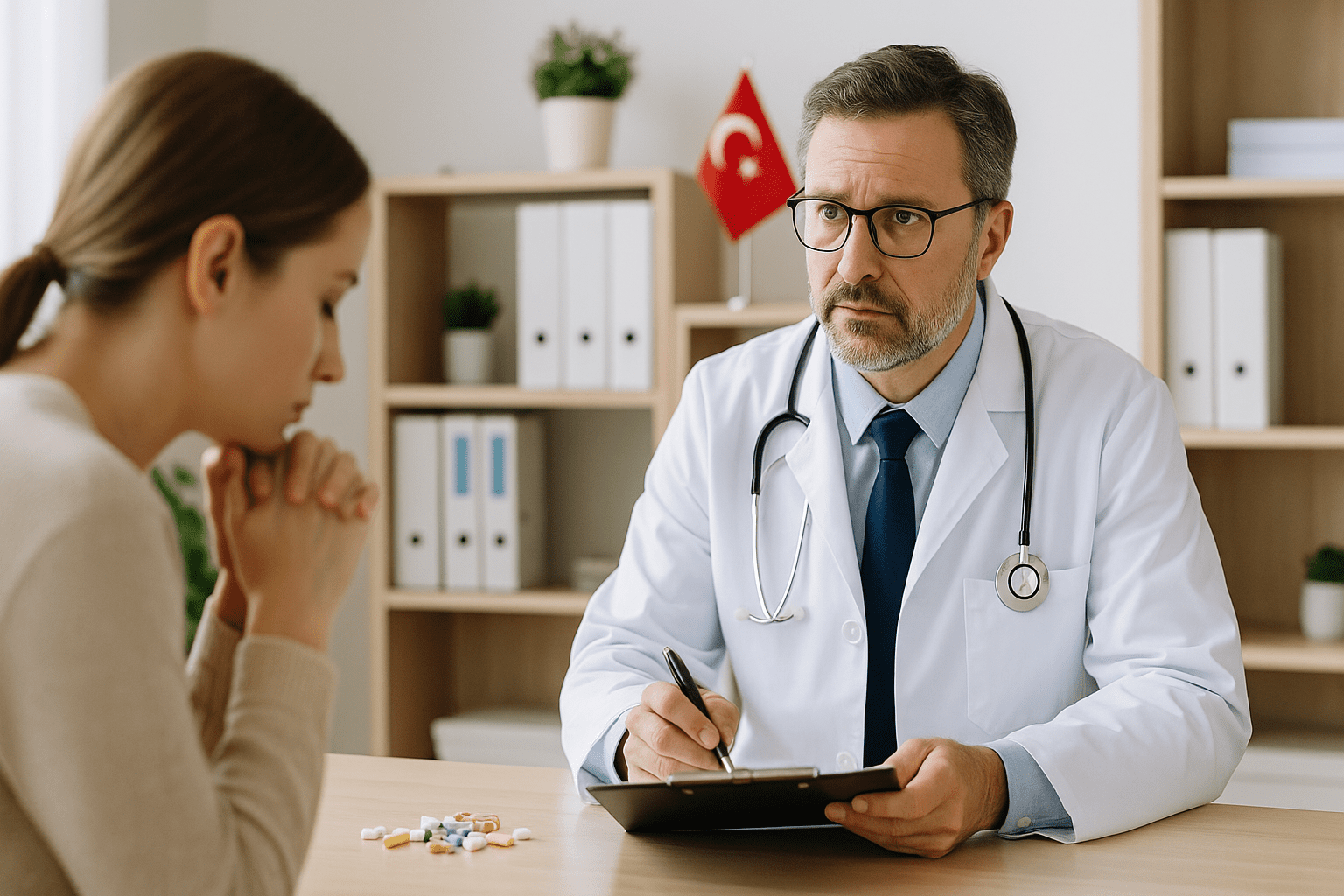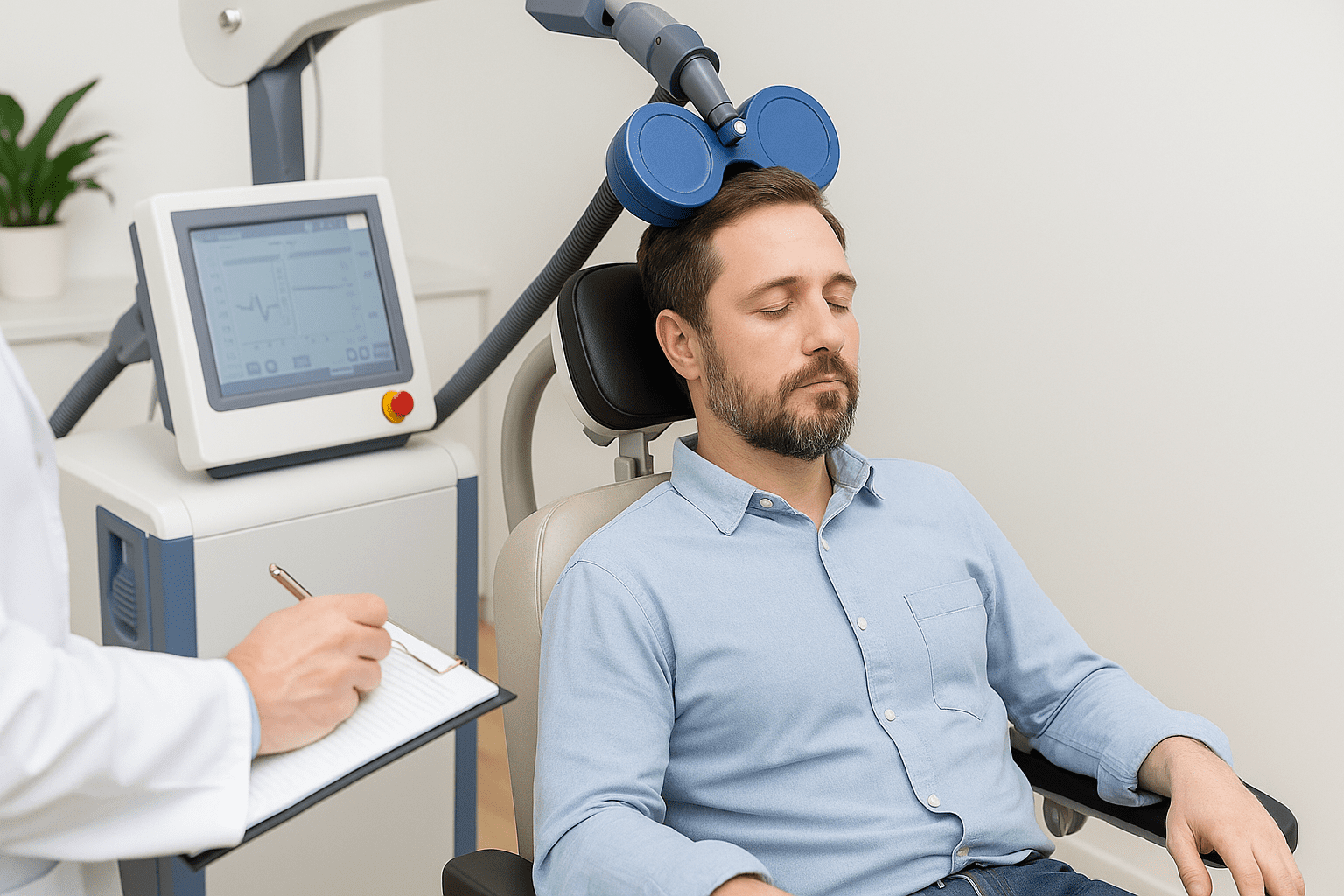Your Complete Guide to Addiction Treatment in Turkey 2025: Modern Scientific Programs | Distinguished Care by Dr. Al-Akkad

Introduction
Addiction is a chronic brain disorder that directly affects the daily functioning of the individual, the family, and society as a whole. Today, Turkey stands out as one of the leading countries offering evidence-based, comprehensive, and cost-competitive addiction treatment, making it a preferred destination for patients seeking true recovery.
In this guide, we will cover:
- The treatment system from the initial phase to full rehabilitation.
- The latest scientific methods applied worldwide.
- The role of Dr. Al-Akkad and his medical team in providing high-quality, individualized, and compassionate care.
- Evidence-based systems and 2025 pricing.
- A comprehensive comparison with competing articles to outperform in search engine rankings.
Why Turkey? (Local Scientific Support)
Governmental and Private AMATEM Centers:
These centers provide multidisciplinary treatment programs, including therapy for opioids, alcohol, smoking, behavioral addictions, and co-occurring psychiatric disorders.
A 2022 Turkish study confirmed that most patients seek treatment in these centers, and that family and community support play a pivotal role in achieving recovery.
Extensive Psychological and Social Support:
Patients seeking treatment require family and professional support, which includes vocational training, physical activity, and education to enable successful social reintegration (Wikipedia).
Step-by-Step Stages of Treatment
1. Assessment and Diagnosis:
Comprehensive medical/psychological evaluation to determine the type and severity of addiction, presence of other psychiatric disorders, and then design an individualized treatment plan.
2. Detoxification (Detox):
Medically supervised in a hospital setting to avoid withdrawal risks, using medications tailored to each type of addiction.
3. Medication-Assisted Treatment According to International Guidelines:
- Opioids: Methadone, Buprenorphine, or Naltrexone.
- Alcohol: Naltrexone, Acamprosate, or Disulfiram.
- Nicotine: Nicotine replacement therapy, Varenicline, or Bupropion.
These medications help control cravings and are widely recommended by WHO and NICE.
4. Psychological and Behavioral Therapy:
- Cognitive Behavioral Therapy (CBT): Highly effective, especially when combined with medication.
- Motivational Interviewing (MI): Enhances internal motivation.
- Family Therapy: Rebuilds family support.
- Contingency Management (CM): A reward-based method to reinforce positive behavior.
5. Rehabilitation and Follow-Up:
Regular check-ups, support groups, and relapse prevention programs.
Focus on social and occupational reintegration.
Modern, Evidence-Based Treatment Techniques
1. Repetitive Transcranial Magnetic Stimulation (rTMS):
- A recent 2024 meta-analysis in Nature found that rTMS reduces cravings with moderate to large effect sizes, especially when sessions are repeated and target the left dorsolateral prefrontal cortex (DLPFC).
- A study on methamphetamine users showed very strong effects in reducing cravings, particularly with techniques like iTBS (Frontiers).
- Another meta-analysis found a moderate sustained effect after 3 months for alcohol addiction, especially when targeting the right prefrontal cortex or interhemispheric regions.
2. Deep Brain Stimulation (DBS):
Still experimental and under research. Shows some benefit in very severe cases but requires surgery and high costs. Recommended only after failure of other options.
3. Recent Research Trends:
A bibliometric analysis confirms that rTMS has become one of the leading modern approaches in addiction treatment, with growing academic interest from 2001 to 2023.
The Role of Dr. Al-Akkad and His Medical Team
- Direct, Personalized Medical Supervision: Dr. Al-Akkad personally evaluates each patient from the first moment and designs a plan that includes medication, behavioral sessions, and family support.
- Use of Globally Proven Protocols: Such as CBT, MI, and CM, with the option to integrate rTMS when necessary.
- Multidisciplinary Team: Includes psychiatrists, behavioral therapists, social support specialists, and experienced nurses.
- Long-Term Follow-Up: Support continues for months after discharge to strengthen recovery and prevent relapse.
- Strong Reputation and Proven Results: The program is well-recognized among both local and international patients for its high effectiveness.
Stages of Addiction Treatment in Turkey 2025 Step by Step
1. Assessment & Diagnosis
The recovery journey always begins with a comprehensive assessment, which is the cornerstone for creating an accurate treatment plan.
- Medical Examination: Includes laboratory tests (blood, liver and kidney function, hormonal tests).
- Psychological Assessment: Through clinical interviews and standardized tests (such as DSM-5 and ICD-11) to determine addiction severity.
- Comorbidity Diagnosis: Such as depression, anxiety, bipolar disorder, or personality disorder.
- Individualized Plan: Each patient receives a personalized treatment plan tailored to their condition.
Reference: The World Health Organization (WHO) recommends dual assessment of both psychological and physical disorders before any intervention, as neglecting one increases the risk of relapse.
2. Detoxification
Detox is the stage where the patient undergoes gradual or abrupt discontinuation of the addictive substance under full medical supervision.
- Goal: To safely overcome withdrawal and reduce physical and psychological symptoms.
- Medical Supervision: Conducted in an inpatient setting to monitor vital signs and prevent complications.
- Medications Used:
- Alcohol withdrawal: Benzodiazepines (e.g., Diazepam).
- Opioid withdrawal: Methadone or Buprenorphine.
- Benzodiazepine withdrawal: Gradual tapering + anticonvulsants when necessary.
- Psychological Support: Short sessions to encourage patient commitment to the program after detox ends.
Reference: The National Institute on Drug Abuse (NIDA) clarifies that detox is not treatment in itself but the first step before entering psychological and behavioral therapy.
3. Medication-Assisted Treatment (MAT)
Medication is a key element in many cases of addiction, helping reduce cravings and prevent relapse.
- Opioids:
- Methadone: Reduces withdrawal symptoms and used in long-term programs.
- Buprenorphine: Safer option, effective in outpatient programs.
- Naltrexone: An opioid antagonist, blocks drug effects if reused.
- Alcohol:
- Naltrexone: Reduces cravings and prevents relapse.
- Acamprosate: Balances neurotransmitters.
- Disulfiram: Makes alcohol consumption intolerable.
- Nicotine:
- Nicotine Replacement Therapy (NRT): Patches or gum.
- Varenicline and Bupropion: Medications proven effective in cessation programs.
Reference: NICE (UK National Institute for Health and Care Excellence) confirms that combining medication with psychological support significantly increases success rates compared to medication alone.
4. Psychotherapy & Behavioral Therapy
Here begins the real treatment, where thinking patterns and behaviors causing addiction are changed.
- Cognitive Behavioral Therapy (CBT): Helps the patient understand the links between thoughts, behaviors, and addiction, and develop new strategies for coping with stress.
- Motivational Interviewing (MI): Focuses on increasing patient motivation and commitment to treatment.
- Family Therapy: Rebuilds trust and activates the family as the first line of defense against relapse.
- Contingency Management (CM): Uses reward systems for progress (such as regular attendance or negative drug test results).
Reference: Studies from NIDA and WHO show that combining multiple behavioral therapies with MAT significantly improves long-term abstinence.
5. Rehabilitation & Aftercare
This stage determines long-term treatment success.
- Aftercare Programs:
- Weekly, then monthly sessions.
- Support groups (12-step or alternatives).
- Follow-ups via phone or digital apps.
- Social Reintegration:
- Helping patients return to work or school.
- Vocational training programs.
- Encouraging healthy activities (sports, hobbies).
- Relapse Prevention Plan:
- Teaching patients how to handle triggers.
- Emergency plans in case of relapse.
Reference: WHO states that aftercare programs reduce relapse rates by up to 40% if continued for at least 12 months.
💡 The Role of Dr. Al-Akkad and His Team in These Stages
What distinguishes Dr. Al-Akkad’s program:
- Comprehensive Supervision: From assessment to long-term follow-up.
- Integration of modern medications with psychotherapy according to the latest protocols.
- Preventive family programs to strengthen their role as primary supporters.
- Use of techniques such as rTMS in resistant cases.
- Extended follow-up for a full year to ensure psychological stability and relapse prevention.
Types of Addiction Treatment Programs in Turkey 2025
After assessment and detox, the patient selects the most suitable program based on their condition, ability to commit, and available family support. Turkey offers all internationally recommended treatment programs.
1. Inpatient / Residential Treatment
Definition:
The patient resides in the hospital or treatment center for 28 days to 3 months or more, depending on severity. A full month of intensive treatment is usually sufficient based on our patient experience.
Advantages:
- Safe environment free of triggers and risks.
- 24/7 medical and psychological supervision.
- Full integration of medication and psychotherapy.
- Daily individual and group sessions.
- Recreational and sports programs to support mental health.
Suitable Cases:
- Severe or long-term addiction.
- Patients with repeated relapse history.
- Patients with co-occurring psychiatric disorders (Dual Diagnosis).
Reference: WHO considers inpatient programs most suitable for severe cases or those lacking family support, as they ensure medical and psychological stability during the critical phase.
2. Outpatient Treatment
Definition:
The patient attends therapy sessions at the center for several hours per week, then returns home. The program may last for several months.
Advantages:
- Lower cost compared to inpatient programs.
- Allows the patient to continue work or studies.
- Provides more scheduling flexibility.
- Highly effective with strong family support.
Suitable Cases:
- Mild to moderate addiction.
- Patients with work or study commitments they cannot leave.
- Patients with strong family support.
Reference: NIDA recommends intensive outpatient programs combining CBT, MI, and medication follow-up to ensure effective results.
3. Intensive Outpatient Program (IOP)
Definition:
Combines features of inpatient and outpatient programs: patients spend longer daily hours (3–6 hours, 4–5 days per week) in the center but return home to sleep.
Advantages:
- More intensive and effective than standard outpatient programs.
- Flexibility to balance treatment with family/work.
- Includes individual, group, and family sessions.
- Nearly daily medical and psychological monitoring.
Suitable Cases:
- Moderate addiction.
- Patients transitioning from inpatient to outpatient care.
- Patients needing intensive support but unable to stay in the hospital.
Reference: NICE confirms that IOPs are ideal for patients not requiring full residential care but still needing close follow-up.
4. Comparison Between Treatment Programs
| Element | Inpatient Treatment | Outpatient Treatment | Intensive Outpatient (IOP) |
|---|---|---|---|
| Duration | 1–3 months (full stay) | Several months (limited weekly sessions) | 2–3 months (daily intensive sessions) |
| Cost | Higher | Lower | Moderate |
| Medical Follow-up | 24/7 | Limited | Almost daily |
| Family Support | Less needed | Very necessary | Medium |
| Success Rate | Highest for severe cases | Effective for mild/moderate cases | Effective for moderate cases and transition from inpatient |
5. The Role of Dr. Al-Akkad and His Team in Choosing the Right Program
- For severe cases: recommends inpatient treatment with full supervision.
- For moderate cases: guides towards IOP with close monitoring.
- For mild cases or those with strong family support: adopts outpatient treatment with continuous medical and psychological follow-up.
Additional Advantage: Dr. Al-Akkad’s team provides gradual transition plans from inpatient → IOP → outpatient, significantly reducing relapse rates.
This integration makes Dr. Al-Akkad’s program one of the strongest in the region, giving patients the opportunity for long-term recovery based on science and expertise.
Modern Techniques and the Best Addiction Treatment Centers in Turkey 2025
First: Modern Techniques in Addiction Treatment
1. Repetitive Transcranial Magnetic Stimulation (rTMS)
- Mechanism of Action: Uses non-invasive magnetic pulses to stimulate specific brain regions responsible for controlling behaviors and cravings.
- Scientific Evidence:
- A recent review published in Nature (2024) confirmed that rTMS significantly reduces drug and alcohol cravings, especially when combined with behavioral therapy.
- A study published in Frontiers in Psychiatry (2022) showed that rTMS reduced cravings in methamphetamine addicts by more than 50% after several weeks of treatment.
- Advantages:
- Non-invasive.
- Few side effects.
- Can be applied alongside psychotherapy and medication.
2. Deep Brain Stimulation (DBS)
- Mechanism of Action: A surgical procedure involving the implantation of electrodes in deep brain areas to control neural activity.
- Scientific Evidence:
- Still under clinical trials, but shows promising results for patients who failed conventional treatments.
- Limitations:
- Very costly.
- Requires surgery.
- Restricted to treatment-resistant cases.
3. Digital Therapy and App-Based Follow-Up
Some Turkish centers have started using mobile applications integrated with the treatment program:
- Appointment reminders.
- Direct chat support with therapists.
- Daily mood and symptom tracking.
This enhances follow-up and reduces treatment dropout rates.
4. Combining Medication + Psychotherapy + Modern Techniques
Global references (WHO, NIDA, and NICE) confirm that the best results are achieved when medication is combined with behavioral therapy and long-term follow-up.
Turkey is considered a leader in this integration, especially in major centers in Istanbul and Ankara.
Second: The Best Centers and Hospitals in Turkey 2025
When starting the journey of finding an addiction treatment center in Turkey, the key is not the hospital’s name or reputation, but the scientific and human standards that guarantee treatment success and continuity.
What should you look for in a treatment center?
- Accreditation and Licensing: The center must be internationally accredited and licensed by the Turkish Ministry of Health to ensure quality and transparency.
- Comprehensive Medical Team: Includes psychiatrists, behavioral therapists, social support specialists, and family therapists working together in harmony.
- Diverse Treatment Programs: Availability of inpatient, outpatient, and intensive programs, with integration of behavioral, medical, and modern techniques such as rTMS.
- Long-Term Follow-Up Plans: Aftercare programs lasting up to one year with clear relapse prevention strategies.
- Supportive and Comfortable Environment: Ensures privacy, comfortable facilities, and therapeutic activities to help patients restore their lives.
- Transparent Costs: Clear details of what is included in the program to avoid financial surprises.
Why choose us?
In Dr. Al-Akkad’s program and his medical team, we guarantee these standards and more:
- Direct supervision of all stages from diagnosis to rehabilitation.
- A carefully tailored treatment plan for each patient.
- Use of the latest globally recommended treatment protocols.
- Extended follow-up even after program completion to ensure stable recovery.
Conclusion: Don’t let big hospital names distract you; focus on the scientific and human standards, and you will find them all available within our program.
Third: The Role of Dr. Al-Akkad and His Medical Team in Integrating Techniques and Centers
- Leadership in Integration: Dr. Al-Akkad ensures the use of modern treatment protocols that combine CBT, MI, CM with advanced techniques (such as rTMS) when necessary.
- Personalized Treatment Plans: Every patient is reviewed by the team to determine the most suitable program (inpatient, outpatient, intensive) with optional supportive technologies.
- Extended Follow-Up: Even after program completion, the team continues to follow up through sessions or digital apps, significantly reducing relapse rates.
Addiction Treatment Costs in Turkey 2025 + FAQs and Conclusion
First: Addiction Treatment Costs in Turkey 2025
Costs vary depending on:
- Program type (inpatient – outpatient – intensive).
- Treatment duration (long-term: 1–3–6 months; short-term: 10–15–30 days).
- Type of hospital (governmental – private – internationally accredited).
- Additional services (translation, hotel accommodation, aftercare).
- Use of modern techniques such as rTMS or DBS.
1. Inpatient Program Cost
- Range: $15,000 – $30,000 per month.
- Includes: medical accommodation, medications, individual and group sessions, nutrition, 24/7 monitoring.
- For full program details, contact us.
2. Outpatient Program Cost
- Range: $5,000 – $10,000 per month.
- Includes: therapeutic sessions (CBT & MI), medication monitoring, family consultations.
- For full program details, contact us.
3. Intensive Outpatient Program (IOP) Cost
- Range: $25,000 – $30,000 per month.
- Includes: daily therapy sessions (3–6 hours), psychotherapy and family therapy, close medical monitoring.
- For full program details, contact us.
4. Modern Techniques Cost
- rTMS: $300 – $500 per session (total $6,000 – $12,000 for a full course).
- DBS: Expensive surgical procedure ($40,000 – $70,000), limited to rare severe cases.
- Often included within the full monthly treatment package at no extra cost.
5. Governmental Centers (AMATEM/YEDAM):
- Symbolic or free costs supported by the Turkish Ministry of Health, mainly for Turkish citizens or residents.
Second: FAQs
- What is the ideal treatment duration?
There is no one-size-fits-all answer. However, studies (WHO/NIDA) recommend at least 3 months for long-term results. We also offer intensive programs lasting just 1 month, which have proven effective with many patients. - Are medications alone sufficient?
Medications are essential for certain addictions (opioids, alcohol, nicotine), but combining them with psychotherapy yields the best results and reduces relapse. - Does relapse mean treatment failure?
Relapse is a common part of recovery and does not mean failure. What matters is having an emergency plan and reintegrating the patient immediately into treatment. - Is treatment in Turkey suitable for foreigners?
Yes, most private centers have international departments, offering interpreters and logistical support. - Does Dr. Al-Akkad provide follow-up after treatment?
Yes, Dr. Al-Akkad’s program includes extended follow-up for up to one year after treatment, with regular in-clinic or online sessions.
Third: Conclusion
Today, Turkey is among the leading countries in addiction treatment based on international scientific protocols, offering:
- Internationally accredited specialized centers (JCI).
- Modern techniques like rTMS.
- Comprehensive inpatient, outpatient, and intensive programs.
- Competitive prices compared to Europe and the US.
Dr. Al-Akkad’s program stands out as one of the most distinguished options, thanks to:
- Direct personal supervision throughout all stages.
- Integration of medications and behavioral therapy following the latest global guidelines.
- Use of modern techniques like rTMS as a supportive tool for resistant cases.
- Extended follow-up plans ensuring sustainable recovery.
If you are seeking comprehensive care based on both science and humanity, then Dr. Al-Akkad’s program in Turkey is the optimal choice for achieving full recovery and returning to a healthy, safe life.



